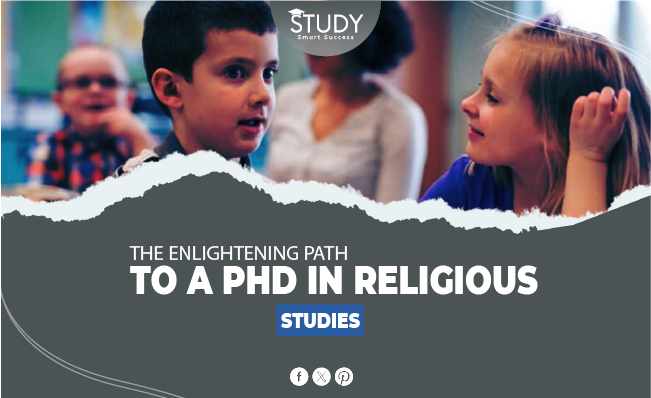With a PhD in Religious Studies, one can investigate world religions and their societal effects. PhDs in theological studies may be the most life-changing and mentally engaging for students, lecturers, and theologians.
Getting a PhD in Religious Studies is both fun and hard work. Religious studies examine spiritual writings, concepts, practices, and social and political situations in depth.
Read more about theology vs religious studies.
Psychological observation and historical research will allow students to understand the impact of religion on individuals and communities. This activity fosters both compassionate and critical development while enhancing understanding of foreign nations and events.
Who Should Consider a PhD in Religious Studies?
A PhD in religious studies could teach you about the significance of religion in people’s life, history, and present implications. Usually, these are the better ones:
- Graduates in Religious Studies, Theology, or a Related Field.
- Individuals interested in academic jobs, teaching at the university level, or engaged in professional study.
- Church, non-profit, and government employees desire to understand how religious issues impact policy and communal life.
- People deeply committed to interfaith discussion want to help people of different religions understand each other and work together.
- Writers and writers who focus on religion or cultural themes look to improve their knowledge and critical skills.
- Anyone sincerely interested in the existential questions of life, ethics, and the philosophical bases of different faiths.
- Curators and historians of religious art, text, and items wish to know their history.
The Rich Tapestry of Religious Studies
A PhD program in religious studies combines several broad fields. They comprise political science, anthropology, sociology, philosophy, and history. Here are some fantastic locations you should see:
- Comparative Religion: From many nations and eras, this study contrasts the customs, literature, beliefs, and practices of many religions.
- Religion and Society: Investigate how society, politics, economics, and culture all affect and are shaped by religion. Studying contemporary events, including religious conflict, tolerance, and interfaith communication, helps one to grasp them better.
- The study of religion and theology: Ask fair questions regarding God, evil, and spirituality.
- History: Research religious societies and rituals to grasp how they have shaped history.
- Religious Ethics and Moral Philosophy: This field studies how religious morality affects medicine, the environment, justice, and human rights.
The Journey to a PhD
A PhD in Religious Studies can take four to seven years, depending on the school and whether you study full-time or part-time. This occurs frequently:
- Coursework: Students study advanced courses in many facets of religious studies, theoretical frameworks, and research techniques in the first years.
- Comprehensive Exams: Students have to complete thorough tests proving their field of competence after classes.
- Dissertation Proposal: Students suggest a novel study project adding fresh insights to religious studies.
- Research and Dissertation: Your dissertation, which is an important scholarly work displaying your results, will take most of your time researching and writing.
- Defense: PhD programs finish with a dissertation defense when you present and defend your research to a panel of experts.
Career Opportunities and Beyond
Individuals with a PhD in Religious Studies are qualified for numerous jobs, including but not limited to:
- Academia: PhD holders want to spread academic information and train future researchers as university lecturers.
- Research: Think tanks, research institutes, and government agencies with an eye toward religious, cultural, and policy-related study present opportunities.
- Publishing and Journalism: With their depth of knowledge, PhD graduates can pursue careers in writing, editing, and publishing, particularly in niches that require expertise in religious studies.
- Interfaith and Community Leadership: Graduates who know a lot about different religions can be very important in interfaith discussion, community development, and running non-profits.
- Museum and Cultural Heritage Work: Religious studies scholars curate religious objects and exhibitions in museums, cultural heritage sites, and historical societies, where their expertise is recognized.
- Consultancy: Businesses and international organizations increasingly consult religion studies specialists on cultural sensitivity, religious diversity, and ethics in a globalized society.
- Education: Through curriculum building, educational consulting, and resource production, PhD grads can assist elementary and secondary schools in understanding religious diversity.
- Policy Analysis and Advocacy: Graduates can influence legislation, work with NGOs, or fight for religious freedom, peacebuilding, and human rights since they comprehend religion’s impact on society.
- Spiritual Care and Chaplaincy: Medical, military, and community groups hire students with pastoral care and theological knowledge to give spiritual assistance.
Final Thoughts
A PhD in Religious Studies investigates human and civilizational themes. Riddle fans confront a challenging yet rewarding route.
Consider that this profound intellectual journey is growing knowledge and changing religious diversity perceptions.
Check out our tools and stories for academic guidance. We’ll assist you throughout your PhD in Religious Studies. That could be the start of a satisfying and important work.



